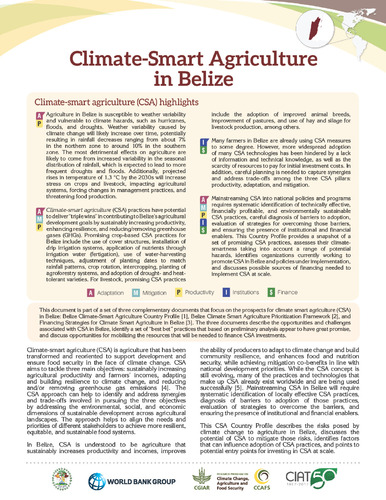Climate-Smart Agriculture in Belize
Climate-smart agriculture (CSA) is agriculture that has been
transformed and reoriented to support development and
ensure food security in the face of climate change. CSA
aims to tackle three main objectives: sustainably increasing
agricultural productivity and farmers’ incomes, adapting
and building resilience to climate change, and reducing
and/or removing greenhouse gas emissions [4]. The
CSA approach can help to identify and address synergies
and trade-offs involved in pursuing the three objectives
by addressing the environmental, social, and economic
dimensions of sustainable development across agricultural
landscapes. The approach helps to align the needs and
priorities of different stakeholders to achieve more resilient,
equitable, and sustainable food systems.
In Belize, CSA is understood to be agriculture that
sustainably increases productivity and incomes, improves the ability of producers to adapt to climate change and build
community resilience, and enhances food and nutrition
security, while achieving mitigation co-benefits in line with
national development priorities. While the CSA concept is
still evolving, many of the practices and technologies that
make up CSA already exist worldwide and are being used
successfully [5]. Mainstreaming CSA in Belize will require
systematic identification of locally effective CSA practices,
diagnosis of barriers to adoption of those practices,
evaluation of strategies to overcome the barriers, and
ensuring the presence of institutional and financial enablers.
This CSA Country Profile describes the risks posed by
climate change to agriculture in Belize, discusses the
potential of CSA to mitigate those risks, identifies factors
that can influence adoption of CSA practices, and points to
potential entry points for investing in CSA at scale.

